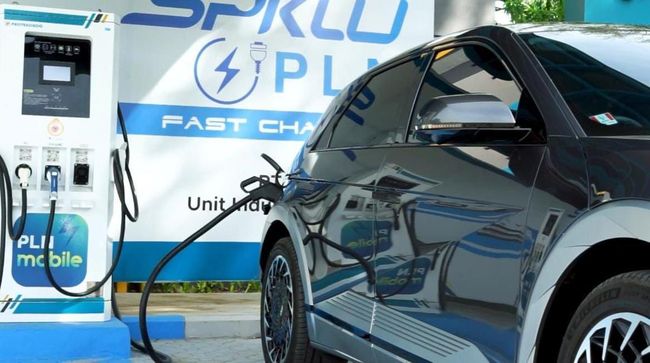Editorial Team, CNBC Indonesia
Sunday, 02/25/2024 21:40 IWST
Photo: Illustration of charging electric vehicles at the PLN Public Electric Vehicle Charging Station (SPKLU) which makes it easier for electric car owners. SPKLU infrastructure is spread throughout Indonesia and to find out the location of the nearest SPKLU, you can see the PLN Mobile application (PLN Doc)
Jakarta, CNBC Indonesia – Electric cars are now starting to be popular, replacing cars that use fuel oil (BBM).
A group of researchers from South Korea found a way to make an electric car capable of traveling up to 1,000 kilometers on just one battery charge. For comparison, the distance from Jakarta to Bali is 1,182.4 km if you take the north coast (Pantura) route of Java.
The focus of research by experts from Pohang University of Science and Technology in South Korea, which was published in the journal Advance Science, is silicon materials.
Silicon is widely researched for use in making batteries because it is abundantly available in various parts of the world. However, silicon also has characteristics that make it problematic.
The size of the silicon element can increase up to three times when charged, then shrink again. Because of this, most research tries to make batteries using silicon material in the form of very small nanoparticles.
The problem is, the cost of producing nanoparticles is very expensive and the process is very complex.
Researchers from Pohang have a different approach. Instead, they used reduced silicon particles 1,000 times larger, namely on a micro scale. Elements of this size are easier and cheaper to produce with greater energy density.
Researchers then looked for a solution to the problem of expanding and collapsing silicon particles. They use an electrolyte polymer gel whose shape changes when the silicon element changes shape. This gel is then chemically bonded with radiation via electron shots. The result is a stable bond even though the silicon particles expand and collapse.
In fact, the stability of the silicon battery made by the researchers is equivalent to a standard lithium-ion battery, with an energy density that is 40 percent greater.
“We use micro-silicon anodes, the result is still a stable battery. This research brings us closer to a high-energy-density lithium-ion battery system,” said Park Soojin from Pohang University, quoted on Sunday (25/2/2024).
The researchers say their battery design can be easily applied.
If these findings are successfully commercialized, it is not impossible that the era of cars with spark-ignition engines powered by fuel will end sooner.
The reason is, so far batteries have been the main obstacle to the transition from conventional fuel vehicles to batteries. Currently, the batteries used by mass-produced electric cars have a maximum distance of less than 800 km.
With a distance of up to 1,000 km on one charge, it will certainly reduce drivers’ worries about using electric cars to drive between cities and between provinces.
Watch the video below:
Video: PLN Mejeng at IIMS 2024, Encourages Electric Vehicle Ecosystem
(mkh/mkh)
2024-02-25 14:40:10
#Korean #invention #bring #gasoline #car
